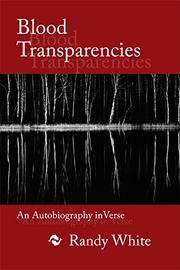


Blood Transparencies
An Autobiography in Verse
by Randy White
This collection of poems explores themes of childhood, family, and growing up, often making ancient connections with the natural world.
White (Motherlode/La Veta Madre, 1977), whose work has appeared in several literary magazines, uses the metaphor of a slideshow in the title poem to link the author’s personal history with the outdoor landscape. In it, family snapshots, ethereally illuminated and projected on a bedsheet screen, are as eternal as fossils; the father’s narration gives substance to the passing moments captured in the photos. The author links this powerful image to the flickering light that illuminates cave art and to Oklahoma red-dirt furrows “full of sunset.” Yet darkness waits in “the pause between slides”—a darkness that is, like a lightbulb-battering moth, “drawn to the brief incandescence / of our lives.” One could also see the slideshow as a metaphor for poetry, which similarly captures moments through illumination and language—often with darkness in the pauses. This poetic autobiography relates a childhood in the Pacific Northwest, where wild nature granted blessings but could be harsh—like the game-warden father in “Wrestling Odysseus,” who teaches his son how to wrestle: “My mother leaves the room, my sisters begin to cry.... // There is no honor, no prize of arms to win in this, / no lesson here but fury.” Yet he’s also the man who brings his son “a cup of ‘Don’t-tell-your-mother coffee.’ ” Other poems explore children’s egotism; the importance of imagination, stories, and family; and how innocence becomes experience. Some especially strong poems describe three seasons of service on a fire crew, a coming-of-age process in which the speaker learns the job, develops camaraderie, dreams of women, and begins to know his profession. White’s fresh images resonate, such as this description of aspen trees carved by generations of Basque shepherds: “The body at burial should be like this, scarred, wound in song / our pitiful histories scratched on paper thin as light.” Family photographs tie in with the title poem’s themes, giving the book another layer of meaning.
Well-crafted verses with strong images and good storytelling.